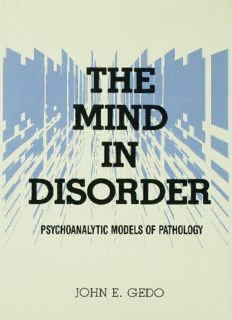
The Mind in Disorder: Psychoanalytic Models of Pathology PDF
Preview The Mind in Disorder: Psychoanalytic Models of Pathology
THE MIND IN DISORDER Psychoanalytic Models of Pathology Copyrighted Material Copyrighted Material THE MIND IN DISORDER Psychoanalytic Models of Pathology John Gedo E. (cid:9) THE ANALYTIC PRESS 1988 Hillsdale, NJ Hove and London Copyrighted Material Copyright 1988 by The Analytic Press. © All rights reserved. No part of this book may be reproduced in any form, by photostat, microform, retrieval system, or any other means, without the prior written permission of the publisher. The Analytic Press. Distributed solely by Lawrence Erlbaum Associates, Inc., Publishers 365 Broadway Hillsdale, New Jersey 07642 Set in Schneidler type by Lind Graphics, Inc., Woodcliff Lake, NJ Printed in the United States of America by Braun-Brumfield, Ann Arbor, MI Library of Congress Cataloging-in-Publication Data Gedo, John E. The mind in disorder. Bibliography: p. Includes index. 1. Mental illness-Classification. 2. Psycho- analysis. I. Title. [DFLM: 1. Mental Disorders- classification. 2. Psychoanalytic Theory. WM 460 G296mb] RC455.2.C4G43 1988 616.89'0012 87-18689 ISBN 0-88163-068-3 10 9 8 7 6 54 3 2 Copyrighted Material Twenty years ago, in her fathers study, Anna Freud encouraged me to question her about him. I wanted to know how he had produced his prodigious volume of work; she told me that he slept little and that she and her mother had devoted their lives to making it possible for him to think and write. This book is dedicated to those who made this possible for me, despite my regrettable propensity for somnolence. Copyrighted Material Copyrighted Material CONTENTS Acknowledgments ix Introduction 1 1 Nosology and the Therapeutic Goals of Psychoanalysis 11 2 Masochism and the Repetition Compulsion 29 3 Epigenesis, Regressive Disorganization, and Reversibility 41 4 Developmental Arrest and the Borders of Integrated Functioning 55 5 Disruption of the Self-Organization as an Inability to Repeat 69 6 Regression, the Psychosomatic Barrier, and the Capacity to Symbolize 81 vii Copyrighted Material viii CONTENTS 7 Repetitive Enactment as Symbolization and Self-Healing 95 8 Transitional Relationships, Adaptive Skills, and Autonomy in Behavior Regulation 109 9 Character, Dyadic Enactments, and the Need for Symbiosis 121 10 Transference Neurosis, Archaic Transference, and the Compulsion to Repeat 133 11 Intractable Character Pathology as the Convergence of Repetition and Apraxia 149 12 Apraxia and the Inability to Learn: A Repiise of Previous Work 165 13 Disorders of Communication: Language, Mfects, and Vegetative Signs 177 14 Disorders of Thought: Magic and Obsessions 187 15 The Conundrum of Sexuality 199 Epilogue: The Art of Psychoanalysis as a Technology of Instruction 211 References 227 Author Index 237 Subject Index 241 Copyrighted Material ACKNOWLEDGMENTS I am indebted to numerous individuals and professional organizations for opportuni ties to try out preliminary versions of much of the material in this volume through oral pre sentations. Chapter 15 was presented at the Panel on Libido Theory of the American Psy choanalytic Association, the Epilogue as a Special Lecture for the Academy of Psycho analysis, and Chapter 4 as a Dialogue on Prim itive Personalities, also at the Academy of Psychoanalysis. Chapter 10 was offered as a Franz Alexander Memorial Lecture, jointly sponsored by the Southern California Psycho analytic Society and the Cedars-Sinai Medical Center, Los Angeles. Chapter 1 was read to the Austen Riggs Foundation at Stockbridge and at the New School for Social Research (Graduate Division). Chapter 9 was presented at the Symposium celebrating the 50th Anni versary of the Washington School of Psychi- ix Copyrighted Material
Description: